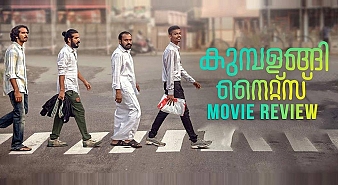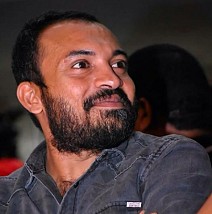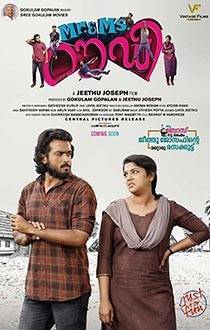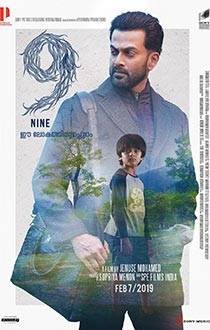KUMBALANGI NIGHTS MOVIE REVIEW


Malayalam cinema has always been at the forefront of portraying idyllic village life at its various shades, ranging from the light-hearted Rakshadikari Baiju Oppu to the more darker, brooding Angamaly Diaries. But what makes debutant director Madhu C Narayanan's Kumbalangi Nights truly special is that the film is at the median of both these representations. It balances the beauty of village life with the gore consequences of rural unemployment, whilst giving a chance for the characters to redeem themselves. The film's portrayal of rural life is not celebratory, as it gives a reality check to the genre.
The film deals with the dysfunctional relationship amongst a family of four brothers, namely Saji, Bobby, Boney, and Frankie in the same order. The film is set in Kumbalangi, a fishing hamlet. The initial portions are filled with some evocative coverage (the film is shot by Shyju Khalid, the cinematographer of Ee.Ma.Yau). This helps us familiarize with the setting. The makers create an atmosphere that is undisturbed by urban lifestyle and trends (the most hi-fi technology is a Bluetooth speaker and a washing machine). Even the snack eaten by Saji is a humble coconut and jaggery. The film also deals with three of the four brothers coming of age as they come to terms with the rigours of adult life in the form of love, responsibility, and a crucial mishap. As far as the younger one is concerned, he is the most matured of the four, despite the age.
The film's antagonist Shami (played by Fahadh Faasil) is an embodiment of every social ill of the Indian, or to a larger extent, Malayali society. Shami is a deeply closeted patriarch whose passive-aggressive behavior is buried under the facade of a forced smile. Shami is obsessed with leveling the corners of his mustache and has a near-insane obsession with “neat-ness”, a term that has many offensive undertones in the country (especially in Kerala). The film tends to be a horror when it comes to the portrayal of this particular character, as there are so many audio-visual cues that convey the feeling.
The makers ensure that the genre-bending touches add more layers to the film without affecting the tonality of the film, as there are various antagonists in the film other than that. Rural unemployment and caste divide are the main antagonists of the film, as they cause a divide between the bonding of the family and sometimes these issues even act as a catalyst that brings not only them, but also a few outsiders together. The film feels less directed and more real, one of the most standout examples includes a scene where Bobby catches a fish from the river. The craft feels extremely invisible. Scenarist Shyam Pushkaran had always had an eye for the absurd (Maheshinte Prathikaram is a fine example) and with this film, he has perfected it, as the portrayal of the antagonist rivals with the writing brilliance of Jordan Peele's Get Out.
The performances elevate the film's brilliant writing. Soubin Shahir beautifully conveys the helplessness of Saji, a man who tries to heal himself by making amends with the people around him. Shane Nigam's natural ease in the performance reminds one of Mohanlal in his early days and has come a really long way. Anna Ben as Baby is a revelation. Ramesh Thilak come up with his most brilliant performance till date despite appearing in a cameo role. But it is Fahadh Faasil's eerie performance that wins the top honour. The actor surprises us in every scene, balancing the tightrope of a character that could've come across as clownish, had the role been played by a mediocre actor. The soothing string oriented music is complemented with tense silences that are often filled by sounds of swaying branches and the rivers (The film was mixed by Tapas Nayak).
The film marks a welcoming change in Malayalam cinema, as the film takes on the issues of caste and class prejudice without giving us any 'in your face' moments These themes that are least addressed by mainstream filmmakers (with a few exceptions taht includes Kammattipadam and Thondimuthalum Dhriksakshiyum).The film's message on familial bonding reminds of Hirokazu Kore-eda's 2018 film Shoplifters, a tale of economically abandoned outcasts becoming a family. Kumbalangi Nights shows a group of socially abandoned individuals becoming a family in front of our eyes. A compelling watch.
BEHINDWOODS REVIEW BOARD RATING
REVIEW RATING EXPLANATION

KUMBALANGI NIGHTS NEWS STORIES
RELATED CAST PHOTOS

KUMBALANGI NIGHTS RELATED NEWS
- Trailer Review Of Super Deluxe
- விஜய் சேதுபதி, சமந்தாவ...
- Much Awaited Super Deluxe Trailer Video Is Here!
- Just In: Second Look Poster From Vijay Sethupathi's Super De...
- Big Update On The Release Of Super Deluxe
- பஹத் பாசில் - சாய் பல்ல...
- பஹத் பாசில் நடிக்கும் ...
- Trailer Of Fahadh Faasil's Next Film Is Here - Check Out
- Njan Prakashan Official Teaser | Fahadh Faasil
- New Video Song From Fahadh Faasil's Next | Aishwarya
- Fahadh's Next Film Trailer Is Here | Highly Intriguing
- Fahadh Faasil Boycotts National Awards! Find Out Why
- Fahadh Faasil And Parvathy Menon Bag National Awards! Detail...
- Nazriya Is Back! This Time With A New Avatar!
- Exciting: The Director Of 'My Dear Kuttichathan' To Make A C...
KUMBALANGI NIGHTS RELATED LINKS
- Kumbalangi Nights | List Of Movies Releasing This Weekend - Slideshow
- Fahadh Faasil | The Various Faces Of Super Deluxe - Slideshow
- Best Malayalam Film - Thondimuthalum Driksakshiyum | 65th National Awards - Winners List - Slideshow
- Best Supporting Actor - Fahadh Faasil, For Thondimuthalum Driksakshiyum | 65th National Awards - Winners List - Slideshow
- Fahadh Faasil-Nazriya | How many films have Kollywood couples acted together in? - Slideshow
- CCV - Option 1 | If Mani Ratnam's CCV Featured Vijay, Ajith, Suriya & Vikram? Check Posters - Slideshow
- Take Off | 10 Best Malayalam Movies of 2017 to watch - By Behindwoods - Slideshow
- Take Off | 6 Malayalam films from the first quarter you shouldn't be saying you haven't watched - Slideshow
- TAKE OFF - Videos
- Thondimuthalum Driksakshiyum | 10 Best Malayalam Movies Of 2017 To Watch - By Behindwoods - Slideshow
- Nimir | List Of Films Remade In Tamil Cinema In The Last 5 Years - Slideshow
- Nimir



























